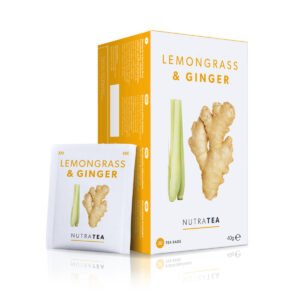After a meal in Asia, Africa, Australia, or the Caribbean, someone might offer you a comforting, aromatic mug of lemongrass tea. Lemongrass (Cymbopogon citratus) soothes frayed nerves, calms an upset stomach, lowers high fevers, reduces pain, and supports collagen production. It is highly anti-inflammatory and antioxidant. Consumed regularly, lemongrass tea helps prevent chronic diseases like cancer, heart disease, and diabetes. Also called citronella, its citrusy essential oils are anti-microbial, anti-fungal, anti-viral, and repel bugs.
Constituents
-
Iron, zinc, calcium, folate, potassium, magnesium, phosphorus, manganese, copper
-
Vitamins C, A, B1 (thiamine), B2 (riboflavin), B3 (niacin), B5 (pantothenic acid), B6 (pyridoxine)
-
Flavonoids
-
Citral
-
Geraniol
-
Borneol
-
Saponins
-
Silica
Citral
Citral is one of the primary mechanisms of lemongrass’s healing powers. It’s a pale-yellow, liquid terpene with a strong, lemony scent. Citral is antimicrobial, anti-fungal, anti-viral, anticancer, and insecticidal. It helps the body synthesize Vitamin A, which is essential for healthy vision, immunity, reproduction, growth, development, and organ function.
Calming
The aroma of lemongrass reduces anxiety. The tea can also promote sleep in cases of insomnia by relaxing tense muscles and nerves.
Digestion
Lemongrass is a traditional cure for stomachache, thanks to the actions of citral, borneol, geraniol, and saponins. Citral reduces intestinal spasms and vomiting by neutralizing bacterial infections in the digestive tract. Borneol stimulates digestion and exerts a calming, anti-spasmodic effect. Geraniol is antiseptic. Saponins are antimicrobial and antifungal.
Furthermore, lemongrass is diuretic, increasing urination volume and frequency and supporting the body’s natural detoxification channels. For this reason, it supports lymphatic drainage and treats edema (excess fluid retention in tissues). This all explains why lemongrass tea is often served after a meal.
Fever
Caribbean healers call lemongrass “fever grass.” They administer tea from the perennial grass species to reduce a high fever. The tea induces sweating, which helps the body release impurities and regulate its temperature.
Cancer and Heart Disease
A powerful free radical scavenger, lemongrass lowers inflammation and oxidative stress associated with cancer and heart disease. Pure citral show antitumor potential, particularly by reducing viability of breast cancer cells. Quercetin is a flavonoid in lemongrass with anti-inflammatory properties that inhibit cancer cell growth and prevent heart disease. Clinical trials support using lemongrass to lower elevated cholesterol. It reduces blood platelet aggregation. Lemongrass has secondary metabolites like quercetin that it uses to defend itself from inflammation and oxidative stress. You harness these by drinking the tea. They include the phenolic compounds luteolin, glycosides, kaempferol, elimicin, catecol, chlorogenic acid, and caffeic acid.
Collagen
Silica helps form the building blocks of collagen, a protein found in the skin, muscles, ligaments, cartilage, and blood. Collagen supports healthy wound healing with minimal scarring and protects joint health. Lemongrass thrives in silica-rich soils. The plant pulls the mineral in and metabolizes silica into a form that humans can process.
Antimicrobial, Antifungal, Anti-biofilm, Anti-viral
Topically, lemongrass essential oil is antibacterial, antifungal, antimicrobial, and anti-biofilm. Thanks to these qualities, it effectively treats infections caused by disharmonious bacteria like Escherichia coli (E. Coli), Helicobacter pylori (H. pylori. The tea successfully treats stubborn Candida Albincans (yeast) infections, including oral thrush. In vitro (outside a living organism) when multiple pathogens form polymicrobial biofilms, lemongrass essential oil disrupts the biofilm matrix and treats the infection more effectively than conventional antibiotics. Also in vitro, lemongrass essential oil inhibits replication of herpes simplex virus type-1 (HSV-1). Some people use the tea to treat fungal acne, and its astringent properties also promote firm skin.
Insecticidal
Bugs flee the scene when they smell lemongrass, which is why lemongrass essential oil makes a great natural insect repellant.
Rheumatoid Arthritis
Applied topically as a compress, lemongrass tea reduces joint and nerve pain from rheumatoid arthritis, thanks to the anti-inflammatory effects of citral and borneol.
Contraindications
Avoid large doses of lemongrass tea when pregnant, as it can stimulate uterine contractions.
NutraTea Lemongrass Ginger Tea
NutraTea herbalists crafted our Lemongrass Ginger tea to lower inflammation and oxidative stress, helping prevent cancer, diabetes, and heart disease. Half lemongrass leaves and half ginger root, this tea blend promotes healthy digestion and strengthens immunity. Relax with a cup after a meal. Breathe in lemongrass’s calming citrus scent and enjoy smooth digestion.



